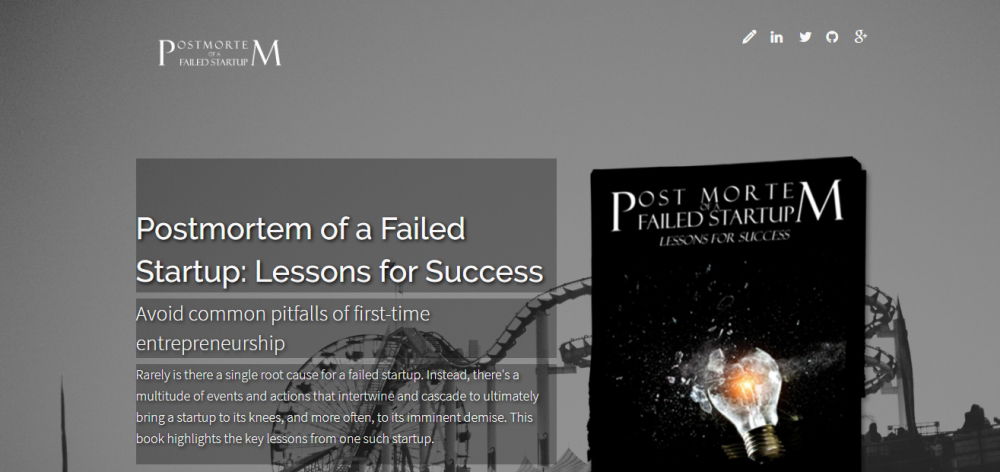Coming to terms with a failed startup? You are not alone!
The recent developments across the globe coupled with the effects of the global pandemic are bound to create ripple effects for businesses of all sizes and scales.
The situation is worse for the already to liquidate or re-vamp their innovation.
Startups of all kinds including tech startups, finance firms, and marketing or media houses are facing the brunt of the lockdown and disrupted supply chains.
Failures are bitter and heart-breaking but are the undeniable truth. For every venture an entrepreneur undertakes, there can be only two outcomes. There’s always a 50-50 chance of success as well as failure.
What hasn’t failed today may fail tomorrow. Failure itself isn’t a negative word. It is a stepping stone, a ladder to success. So why shy away from it?
Why Do Startups Fail?
The statistics are out in the open. In startup culture, 90% of the ventures promising to bring new disruptive innovation in the industry fail.
10% of these startups shut down in the first year while 70% succumb in the death phase of two to five years. 29% of startups fail due to the rapid exhaustion of funding resources and burnout of personal money.
Wondering about what to do after a startup fails? Brace yourself mentally before you get down to pick up the ashes of your broken dream.
The failure of a startup will hurt bad and it is only natural to feel that way.
But remember, that it’s not the end of the road.
What you have nurtured as a baby has finally ceased to exist. You ought to come to terms with this loss.
Because no success is final, and no failure is fatal. Your mindset should be to treat this as a scar of glory in your conquest and move forward with it.
How To Handle A Failed Startup?
Having a failed startup is never a problem; accepting the failure is.
Get comfortable with failure to become successful again. What gets an entrepreneur’s support for future jobs or ventures is his grit and learnings from failed experiences.
-
Go back to the basics.
Post-mortem analysis is extremely important to learn what went wrong and what lessons for the future may be derived from it. Trace out your start-up journey with a map arrowed backward.
Look back at all the points of significant decisions the company made and what were the implications of those decisions. This should be your priority in the list.
-
Compile all your company reports and analyze them.
All major blunders are the consequences of small mistakes that go unnoticed and unattended for too long, or sometimes completely. There are often warning signs to these minor mistakes that prudent businessmen catch in the early stages.
The missing receipts in record keeping books, the recurrent delay or failure in tax payments, or the emotional pricing of products are all small but evident signs of an impending disaster.
They need to be taken in context with the larger picture of the business to arrive at the results.
You may also seek an expert’s help, such as consultants, in analyzing these reports to guide you through the intricacies of financial or technological blunders that have inadvertently been committed.
It will pave the way for you to determine the causes of a failed startup.
-
Evaluate the company’s assets.
A thorough analysis of your company documents will give you an overview of what the company owns and in what capacity such as joint name or singularly.
Assets may also be there in the form of technology, patents, and intellectual property.
Evaluate them prudently and arrive at what can be gained out of these assets. Use this information for your future plans.
-
Strategize.
After completing the ‘what went wrong’ stage, it is time to move to the ‘strategy’ phase.
This is more of a brainstorming phase wherein you chalk out the alternative methods you could have undertaken to implement your plans.
It is also the thinking phase where you reflect upon your past mistakes.
Could you have been more accommodating to the market demands? Did you do the customer research correctly?
Were the cash flow perils ignored for too long and without any proper backup? These are a few questions that need to be answered in the case of failed startups.
What Can Entrepreneurs Do After A Failed Startup?
-
Take a break and reflect
Taking a break can give help you open your mind and give you the time to reflect on what worked and didn’t work. Reflecting could also bring you face-to-face with the next big idea that will disrupt the industry.
You may discover a problem whose solution has not yet been found or readily available to the masses. This may be your next big breakthrough!
-
Write.
Organize your thoughts, take down your learnings from your failure experience systematically, and write a book or start a blog!
A lot of failed entrepreneurs have tried this and some have tasted runaway success as authors of best-selling books and super successful blogs.
Pen down your own startup experiences for other budding entrepreneurs out there and write a blog or book on What To Do After A Startup Fails? This might be your time to shine!
-
Join Business School.
Your startup may have suffered due to any reason, such as operational or supply chain issues, bad marketing, and product management, or cost and pricing problems.
Hone your skills in a professional environment and prepare for your second innings. A grad school will help you in learning the best industry practices and trends.
It will help you get professional guidance on dealing with a failed startup and starting a successful one.
-
Take up a job
After your entrepreneurial hustle, you may actually find it calming to switch to a regular 9 to 5 job for some time.
Take up an assignment, which excites you and holds the right avenues for you to learn, grow, and build your finances.
With your experience of managing a startup, you may easily be consumed in the middle management level of another company.
-
Socialize and build contacts.
As a startup owner, you may have made many professional connections and a few of them might have turned sour due to unfavorable circumstances. It’s time to repair old bridges and make new ones.
Connect with new investors and venture capitalists. A little homework never hurts anyone. How well you have worked with your past investors and how you managed your company will drive new investors and opportunities toward you in the future.
Seek out all the online events that might help you connect and explore new opportunities.
-
Accept that learning is a continuous process.
Explore new opportunities with successful counterparts in the startup segment.
Try to get into the startup mold once again, but this time as an employee, not as a stakeholder.
Apart from losing the job, if the startup shuts down, the risks and responsibilities of an employee are limited. Working with a startup team will give you an insight into how other entrepreneurs operate and perform under stress.
If you are feeling a little lost after your startup has failed, that’s normal. It’s a phase that will lose its grip on you with time. Meanwhile, if you are looking to find some support, there’s a whole community that has had the same experience as you. Connecting with them can help you come to terms with your own experience.
Here are 6 such resources that will help you navigate life after a failed startup:
1. collapsed.co
Collapsed tracks and analyzes failed startups so startups don’t make the same mistakes that others have made.

2. theshutdown.site
When you know it’s time to move on, fill out this survey, and help others in the community!

3. startups-recycled.com
Make the most of what’s left. A place for you to put up your startup’s digital assets for sale!

4. postmortemofafailedstartup.com
A book that highlights the key lessons from a failed startup.

5. startupmemorialgarden.org
The Startup Memorial Garden is the place where the world meets failed startups. A place for remembrance, learning and words of sympathy.

6. failory.com
Interviews with failed (and successful) founders. They have a podcast too!

Conclusion
People often fall flat in this race because either their ideas do not align with their innate skill set or they have a poor analysis of their target audience.
If B2B selling of food products is the new rage in the industry right now, it does not mean you have to jump at the opportunity to encash it even though you are a hedge fund guy!
Do what YOU are best at and what problems can you solve for your target audience, success will inevitably follow.

